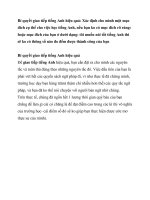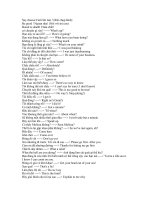Teacher asking for help US
Bạn đang xem bản rút gọn của tài liệu. Xem và tải ngay bản đầy đủ của tài liệu tại đây (325.01 KB, 10 trang )
Functional English
Asking for Help
Let’s Learn
Being able to ask for help is an important language skill. In this lesson,
you will learn a few di erent ways to ask for help. You will also learn
how to o er assistance to others and how to tell others you can t help.
Warm-Up
Note:
A HELPING HAND
In English, “a hand” sometimes means “help.” You can say “I need a hand”
when you need help. You can ask “Do you need a hand?” when others
seem to need assistance. Have you o ered a helping hand recently?
Copyright 2018, Red River Press nc. For use by ESL Library members only.
( LO W I N T / V E R S I O N 3 .1)
The phrase to give a hand
can also mean to give a
round of applause (to clap).
1
Asking for Help
Functional English
Useful Expressions
Listen to your teacher ask for and o er help.
Then recite these phrases together as a class.
A. Questions
Asking for Help
O ering Help
•
Could you give me a hand?
•
Can I help you?
•
I could use some help.
•
Do you need a hand?
•
Help me, please.
•
What can I do for you?
•
Do you have a minute?
•
Is there anything I can do to help you?
•
Would you mind lending me a hand?
•
Is there anything else?
•
Can I ask a favor?
•
Can I be of assistance?
•
Can you do me a favor?
•
I have a favor to ask you.
•
I need a big favor.
•
Can you help me... (base verb)?
•
Could you... (base verb) for me?
B. Responses
Agreeing to Help
Accepting Help
Declining Help
•
Of course.
•
Thank you!
•
•
No problem.
•
I appreciate it.
•
That s okay.
•
Sure.
•
Thanks for your help.
•
Thanks for o ering.
•
You re the best.
•
m all right.
•
m ne. Thanks, though.
Copyright 2018, Red River Press nc. For use by ESL Library members only.
( LO W I N T / V E R S I O N 3 .1)
m okay, thanks.
2
Asking for Help
Functional English
Dialogues
Read the dialogue and practice with a partner.
Dialogue 1
Dialogue 2
ASKING FOR HELP
OFFERING TO HELP
A:
Would you mind lending me a hand?
A:
Is there anything I can do to help?
B:
Sure. What can I do for you?
B:
Not at the moment, thank you.
A:
Could you hold the door open for me?
A:
Really? You look so busy.
B:
No problem. Is there anything else?
B:
There is one thing you could do.
A:
Actually, there s a door downstairs too.
Could you get that one as well?
A:
Just say the word.
B:
Would you mind closing the windows?
B:
Of course.
A:
No problem.
B:
I appreciate it.
Dialogue 3
DECLINING HELP
A:
B:
Those boxes look heavy. Can I give you a hand?
m okay. You could hold the door for me, though.
A:
No problem. Can I take something for you?
B:
That s okay. They aren t as heavy as they look.
A:
Is there anything else I can do?
B:
m ne. Thanks for o ering.
Copyright 2018, Red River Press nc. For use by ESL Library members only.
( LO W I N T / V E R S I O N 3 .1)
3
Asking for Help
Functional English
Writing Practice
A. Complete the Dialogue
Complete the dialogue, and practice with a partner.
A:
Those
heavy . Can I give you a hand?
1.
B:
m okay. Would you mind holding
for me, though?
2.
A:
No problem. Can I
for you?
3.
.
B:
4.
B. Sentence Building
Choose the correct word below each line to complete the requests for help.
1.
I ask you a favor?
(Do / Can)
2. Could you
me a hand?
(to lend / lend)
3. I wonder if you could
me.
(help / to help)
4.
you have a spare moment?
(Can / Do)
5. I could
your help for a second.
(use / to use)
Copyright 2018, Red River Press nc. For use by ESL Library members only.
( LO W I N T / V E R S I O N 3 .1)
4
Asking for Help
Functional English
Speaking Practice
Take turns asking for help with these tasks.
1.
Moving boxes
2. Making dinner
3. Doing homework
5. Picking up mail
4. Looking after a pet
6. Watching luggage
Further Learning
A. Declining
There are di erent expressions to use when you can t help a person.
You can choose whether or not to add a reason.
Example
Useful Phrases
•
m sorry. can t.
(Add a reason if you want to.)
A:
Can I ask you a big favor?
wish could, but can t.
(Add a reason if you want to.)
B:
Sure, what is it?
•
A:
I need to borrow 20 dollars.
•
m sorry. m busy right now.
(Use this for an immediate request.)
B:
Oh, m sorry. m broke.
•
m sorry. m not available.
(Use this for a request in the future.)
B. Practice
Change the dialogue to a request that you made recently.
Try your dialogue with a partner.
Me:
I have a favor to ask you.
:
I need you to
Me:
:
Me:
What can I do for you?
.
I wish I could help, but
.
Oh, that s okay. Don t worry about it.
Copyright 2018, Red River Press nc. For use by ESL Library members only.
( LO W I N T / V E R S I O N 3 .1)
5
Asking for Help
Functional English
Review
Task 1
WORDS & EXPRESSIONS
List as many words and expressions
as you can to ask for help and o er to help.
Asking for Help
O ering to Help
Task 2
Task 3
COMPLETE THE DIALOGUE
ROLE-PLAY
Now complete the dialogue between two friends.
Work with a partner. One of you is a teacher who
needs a hand. The other is a student. Role-play an
exchange between the teacher and the student.
The teacher will accept help but then decline an
additional o er of help. Your teacher/classmates
will answer the following questions:
A:
me a hand?
B:
Sure. What can I
A:
Could you
B:
No
A:
Actually, could you
B:
Of course.
A:
Thank you! You re the
you?
for me?
. Is there anything else?
1.
What does the teacher need help with?
?
2. What happens rst? Does the teacher ask
for help or does the student o er to help?
!
3. What type of help does the teacher decline?
Copyright 2018, Red River Press nc. For use by ESL Library members only.
( LO W I N T / V E R S I O N 3 .1)
6
Asking for Help
Functional English
Role-Play Assessment Tool
Student / Group:
Date
Level
Assessed By
Achieved
Role-Play Scenario
Skill
Asking for Help /
O ering to Help
Speaking
Achieved With Help
Needs Improvement
Criteria
asks for help or o ers to help
responds appropriately
uses polite language
speaks loudly and clearly
takes turns speaking
Notes
Copyright 2018, Red River Press nc. For use by ESL Library members only.
( LO W I N T / V E R S I O N 3 .1)
7
Asking for Help
Functional English
Learner Re ection
ASKING FOR HELP
Add check marks () to show what you've learned in this lesson.
Name:
Date:
Yes (very well)
Yes (with help)
Not yet
Can I...
use a variety of ways to ask for help?
use a variety of ways to o er help?
respond by accepting help or
agreeing or declining to help?
give a reason why can t help?
My Notes
Copyright 2018, Red River Press nc. For use by ESL Library members only.
( LO W I N T / V E R S I O N 3 .1)
8
Asking for Help
Functional English
Answer Key
LESSON DESCRIPTION:
LEVEL: Low Int
In this lesson, students review language and useful
TIME:
1 hour
TAGS:
functional English, useful expressions,
expressions to use when asking for help. They also
practice o ering help and responding when unable to help.
socializing, asking for help, o ering to help
Let’s Learn
Writing Practice
Go over the learning objective with your students.
A. COMPLETE THE DIALOGUE
Warm-Up
Answers will vary.
1.
boxes look
ntroduce the term a hand, which can mean help/assistance, and
2.
the door
go over the various verbs that can be paired with it (give, lend, need).
3.
take something / do something else
4.
Useful Expressions
Recite the words and expressions and have your
students repeat after you for intonation practice.
Dialogues
Read the dialogues out loud or in pairs.
m ne, thanks.
B. SENTENCE BUILDING
1.
Can
3.
help
2.
lend
4.
Do
5.
use
Speaking Practice
Put students in pairs to practice the scenarios.
After they ve practiced asking for help,
you could have them practice o ering to help.
(continued on the next page...)
Copyright 2018, Red River Press nc. For use by ESL Library members only.
( LO W I N T / V E R S I O N 3 .1)
9
Asking for Help
Functional English
Answer Key cont.
Further Learning
SPELLING NOTE:
This lesson shows the American spelling of the words Favor
After reviewing the examples, have students repeat the scenarios
and Practice. Most other English-speaking countries spell these
from the Speaking Practice section. This time they will practice
words this way: Favour and Practise (when used as a verb; Practice
saying no and giving reasons or excuses why they can t help.
when used as a noun). Make it a challenge for your students
to nd these words in the lesson and see if they know the
Review (Assessment Tasks)
The last three tasks are optional and can be used for assessment
purposes and/or review practice. Task 3 includes an assessment
alternate spellings.
ABOUT THE EMOJI:
tool that you can share with learners so that they understand
The emoji (and their derivatives) used in this lesson are from
your expectations.
Twemoji, an open-source project by Twitter. They are licensed
under CC-BY 4.0. />
TASK 1
Give students a few minutes to make a list
of ways to ask for and o er help. Answers will vary.
TASK 2
Have students complete the text based on words
and expressions they learned in this lesson. Answers will vary.
TASK 3
If you want to use this task for summative assessment, hand out
the ready-made Role-Play Assessment Tool (page 7), or personalize
your own from a template in Shared Criteria for Success:
/>Place students in pairs and have them do a role-play for the class
(or just for you) using the scenario provided. Alternatively, you
could provide a unique scenario for each pair using your own ideas.
Learner Re ection
When you are nished with this lesson, have your
students re ect on their learning by lling in the chart.
Copyright 2018, Red River Press nc. For use by ESL Library members only.
( LO W I N T / V E R S I O N 3 .1)
10









